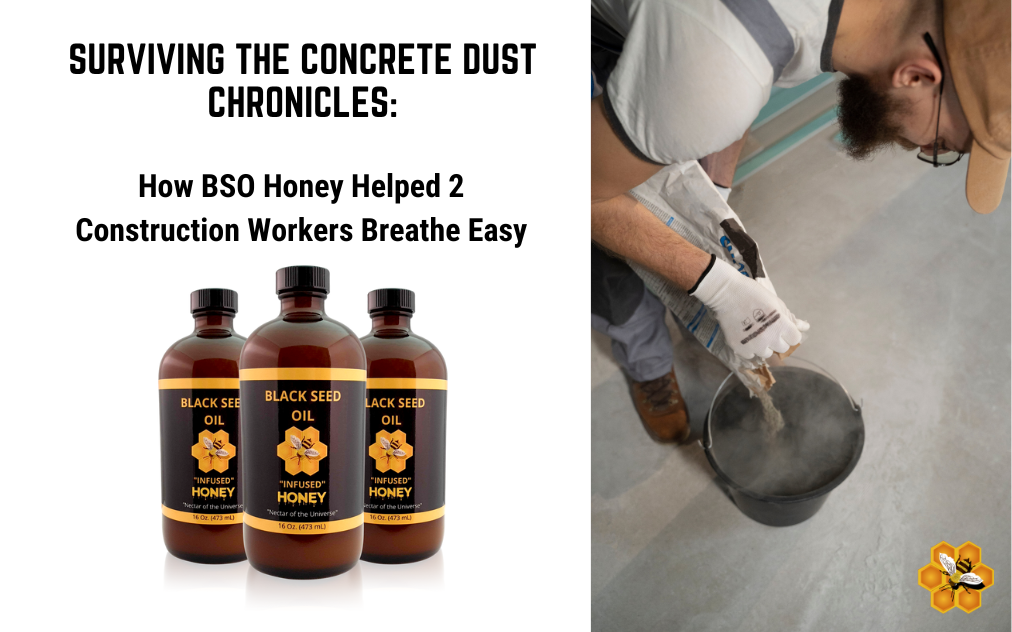Construction, it’s hard work, and for anyone who’s ever worked with concrete, it can be hungry work. You are likely familiar with a few risks associated with construction jobs. Falling, injury, burns, and dust, to name a few. That last point, dust, can be a risk that many don’t give much attention to, but it can have long-term impacts you may be unaware of.
A couple of weeks ago, two friends of mine were on a construction job that involved mixing and pouring concrete. Each bag of concrete weighed about 80 pounds, and they had to use approximately 12 bags or so to get the concrete they needed. It was a scorching summer day, but they pushed through and finished the job. As they wrapped things up and headed home for the day, the younger of two workers started wheezing. Having worked in construction for a number of years, the older of the two immediately recognized the symptoms; the dust from poring the concrete for mixing was irritating their lungs and airways.
The dangers of concrete dust:
Even if you haven’t inhaled concrete dust before, you’ve probably experienced some sort of lung irritant at some point in your life, so you’ll likely be able to sympathize a little with what I’m about to say next.
Concrete dust contains particulates such as cement, sand, gravel, and a few other things that, when inhaled, can be dangerous to your health.
Respiratory irritation: As you might imagine, fine abrasive sediments like sand and gravel can irritate the airways and lungs, leading to things like coughing, sneezing, and inflammation. We have these responses because our body recognizes that something is inside of it that isn’t supposed to be there. So in an effort to expel the foreign substance, an immune response is triggered, leading to these uncomfortable (albeit well-intended) symptoms.
Silica inhalation: Silica is a constituent of concrete dust. If you’ve ever taken geology, you may recall that silica is commonly found in quartz. When inhaled, silica particles have been known to cause a condition known as Silicosis, a severe lung disease that can cause inflammation and scarring in the lungs. This condition is irreversible and can be fatal.
Pneumonia and Bronchitis: It may come as no surprise that the particulates of concrete dust can lead to complications such as these. The fact of the matter is that the inhalation of concrete sediments will increase your risk of developing life-altering and potentially life-threatening complications. The risk of developing complications such as these is exacerbated if the dust is contaminated.
Lung cancer: Oftentimes, lung cancer is associated with smoking; however, other things can increase the likelihood of developing lung cancer. Prolonged exposure to air contaminants, such as silica in concrete dust, has been linked to an increased risk of the development of lung cancer.
Asthma: chances are you know at least one person with asthma. Contaminants in the air can exacerbate this condition, triggering an asthma attack or even worsening it.
COPD: COPD, or Chronic Obstructive Pulmonary Disease, is a progressive lung disease that makes breathing difficult. COPD can develop after long-term exposure to concrete dust.
The complications associated with inhaling concrete dust are not just limited to the lungs. Some studies suggest that long-term exposure to concrete dust can impact your heart, leading to cardiovascular complications.
What happened next?
The older of the two construction workers had some BSO Honey on hand, so he took some and encouraged his co-worker to do the same. They each took two doses of the supplement. The swelling and irritation subsided significantly within a few minutes after taking the first dose. This made it significantly easier for them to cough up the sediments and clear their lungs (not to mention breathe). By the next day, they were as good as new, without a single cough or sniffle heard the entire day.
This outcome was a far cry from what the older construction worker had experienced in the past when working with concrete. I asked him about this, and he mentioned that he would get a lung infection every time he had to mix concrete before he started using BSO Honey. And after researching the danders of concrete dust, it’s easy to see why. The infections he used to get were so bad he would often have to go to the dosages to get a steroid and an antibiotic to help the infections go away. As you might expect, this process took several days, meaning he was sick for quite a while after these jobs.
Prevention
Naturally, in environments with compromised air quality, a mask of some sort can help filter out harmful constituents making the air a bit safer to breathe. You’ll also want to wear eye protection and gloves if you work with and are exposed to concrete dust. It is important to follow all safety precautions in your field of work.
How BSO Honey helped
We’ve talked about inflammation extensively over these blogs, but just as a quick refresher, inflammation is the #1 cause of illnesses and deaths. Many conditions, pains, and health complications can be traced back to inflammation. So it stands to reason that if you can reduce inflammation, you can improve your overall health and quality of life. Inflammation is usually the result of an immune system response to harmful stimuli like a virus, bacteria, damaged cells, radiation, or in this case, concrete dust. At its core, inflammation serves to eliminate the initial cause of cell injury, gets rid of damaged cells, prevents the spread of damaged or affected cells, and start repairing damaged tissue. For as powerful a healing process as this can be, too much inflammation or chronic inflammation) can be a double-edged sword. Swelling very often can restrict blood flow, meaning affected cells in the area cannot get the proper nutrients they need, in turn slowing or halting growth and healing processes. Additionally, swelling can make it more difficult for the body to expel harmful foreign substances. Take, for example, you have concrete dust in your lungs. Your body responds by creating phlegm surrounding the foreign body and helping you cough it back up. However, if you also have inflammation in your lungs and airways, the restriction will make it more difficult for you to expel the phlegm. This means that the foreign body that triggered the inflammation in the first place stays in your body longer, keeping your immune system on high alert and your body inflamed.
BSO Honey is an all-natural liquid supplement that reduces inflammation in the body. When taken regularly, you can boost your immune system, dramatically reduce aches and pain, and, as in the case of the construction workers in our store, recover (and help prevent illnesses) from foreign substances entering your lungs and airways.
Improve your life and overall health one tablespoon at a time. Visit our online store to get started today.

